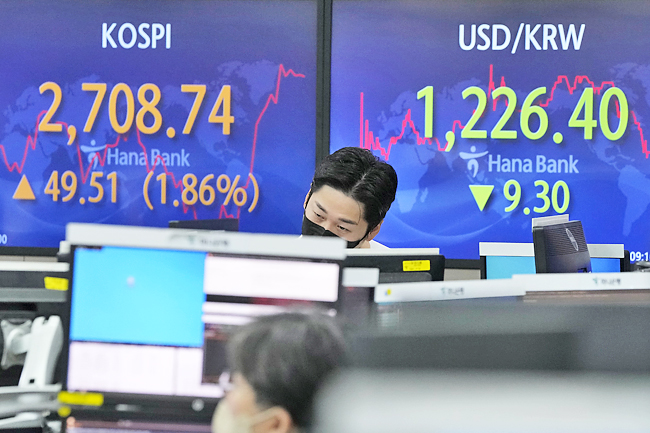BEIJING (AP) – Asian stock prices surged for a second day yesterday after the Federal Reserve announced its first interest rate hike since 2008 and China promised support for its real estate and Internet industries.
Hong Kong’s benchmark jumped more than six per cent and Tokyo gained more than three per cent. Shanghai, Seoul and Sydney also advanced.
Oil prices gained nearly USD2 per barrel but stayed below USD100.
Wall Street’s benchmark S&P 500 index rose 2.2 per cent on Wednesday after the Fed raised its short-term lending rate by 0.25 percentage points. The widely anticipated change was less than the 0.5-percentage-point hike advocated by some officials.
“First rate hikes in a tightening cycle don’t normally signal the end of a bull market,” Shane Oliver of AMP said in a report. “But they are consistent with a more constrained and rougher ride. High inflation and the war in Ukraine also add to the risks.”
Asian markets also were buoyed by Wednesday’s promise by the Chinese government that it would “invigorate the economy” by supporting the struggling real estate industry, Internet companies and entrepreneurs who want to raise capital abroad.
Chinese leaders appeared to be trying to rebuild private sector confidence after a drumbeat of anti-monopoly, data-security and anti-debt crackdowns caused stock prices to plunge.

The Hang Seng in Hong Kong rose 6.2 per cent to 21,330.72, adding to the previous day’s explosive 9.1 per cent gain.
The Nikkei 225 in Tokyo surged 3.5 per cent to 26,508.77 and the Shanghai Composite Index advanced 2.6 per cent to 3,252.97.
The Kospi in Seoul was 1.8 per cent higher at 2,705.94 and Sydney’s S&P-ASX 200 added 1.1 per cent to 7,257.30. India’s Sensex opened up 1.8 per cent at 57,811.37. New Zealand and Southeast Asian markets also gained.
The Fed, in a move officials discussed in advance, is trying to cool inflation that is at a four-decade high by gradually withdrawing ultra-low interest rates and other stimulus that boosted share prices.
Other central banks also are preparing to withdraw stimulus they poured into the global economy after the coronavirus pandemic struck.
That is fuelling anxiety among investors about economic growth, which also faces threats from Russia’s war on Ukraine, coronavirus outbreaks in China, soaring oil prices and uncertain global consumer demand.
Forecasters expect as many as seven United States (US) interest rate hikes this year.
Fed chairman Jerome Powell said that before the Russian invasion of Ukraine he expected inflation to stabilise in the first quarter of this year. He said he now believes inflation will come down in the second half.
The S&P 500 rose to 4,357.86. The Dow Jones Industrial Average added 1.4 per cent to 34,063.10. The Nasdaq composite gained 3.8 per cent to 13,436.55 for its biggest daily gain in 16 months.
In energy markets, benchmark US crude added USD1.61 to USD96.65 per barrel in electronic trading on the New York Mercantile Exchange. The contract fell USD1.40 to USD95.04 on Wednesday. Brent crude, the price basis for international oils, gained USDUSD1.83 to USD99.85 per barrel in London. It declined USD1.89 the previous session to USD98.02.
Oil prices jumped in late February over concern President Vladimir Putin’s war on Ukraine might disrupt supplies from Russia, the second-biggest exporter.


